R.W. Holmen's Blog: Spirit of a Liberal, page 4
March 10, 2014
Breaking: Methodist trial dismissed
[[ This is a content summary only. Visit my website for full links, other content, and more! ]]

March 6, 2014
Cast of characters: Bradley Schmeling and Darin Easler
[[ This is a content summary only. Visit my website for full links, other content, and more! ]]

February 19, 2014
Cast of Characters: Pastors Karen Dammann and Beth Stroud
[[ This is a content summary only. Visit my website for full links, other content, and more! ]]

February 17, 2014
Cast of Characters: Gene Robinson
[[ This is a content summary only. Visit my website for full links, other content, and more! ]]

February 11, 2014
Cast of Characters: Anita Hill
[[ This is a content summary only. Visit my website for full links, other content, and more! ]]

January 28, 2014
Cast of Characters: Walter Righter
[[ This is a content summary only. Visit my website for full links, other content, and more! ]]

November 13, 2013
Cast of characters countdown: David Bailey Sindt
Is Anybody Else Out There Gay?
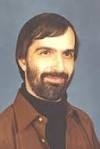 Rev. David Bailey Sindt, a gay Presbyterian pastor, provoked the 1974 General Assembly of the United Presbyterian Church when he asked this question with a sign held high. Pastor Sindt’s sign was no mere whim. It was part of a calculated strategy, a “ministry of presence,” that Sindt and other LGBT activists within the ecumenical denominations would pursue. By their openness and their presence, they implicitly proclaimed, “We’re here, we’re queer, and we’re Presbyterian (or Lutheran, or Episcopalian, or Methodist, or UCC), but we’re not merely the gay issue; we’re flesh and blood human beings.”
Rev. David Bailey Sindt, a gay Presbyterian pastor, provoked the 1974 General Assembly of the United Presbyterian Church when he asked this question with a sign held high. Pastor Sindt’s sign was no mere whim. It was part of a calculated strategy, a “ministry of presence,” that Sindt and other LGBT activists within the ecumenical denominations would pursue. By their openness and their presence, they implicitly proclaimed, “We’re here, we’re queer, and we’re Presbyterian (or Lutheran, or Episcopalian, or Methodist, or UCC), but we’re not merely the gay issue; we’re flesh and blood human beings.”
Pastor Sindt’s assertive coming out serves as the pan-denominational theme for the seventies, and his courageous action at the General Assembly is credited as the birth of More Light Presbyterians. In the heady movement days of the early seventies, Sindt and Rev. Bill Johnson served on a task force originating with the San Francisco Council on Religion and Homosexuality and recognized by the National Council of Churches. The task force served as resource for the startups of denominational advocacy groups. In 1975 Sindt met with the organizers of the first gathering of gay Methodists, and Sindt was present as resource person during the first national gathering of Integrity, the Episcopal advocacy group, that same year. Three task force members served as resource persons at the 1974 Minneapolis gathering that birthed Lutherans Concerned.
As the decade wound down, Sindt was joined by gay seminarians Bill Silver and Chris Glaser as leaders of More Light Presbyterians. Silver’s request for ordination in the New York Presbytery was kicked upstairs to the General Assembly for “definitive guidance.” The General Assembly responded with the creation of a task force that included Glaser as a member. The task force eventually submitted a gay-friendly report to the 1978 General Assembly, but commissioners (delegates) rejected the report and overwhelmingly rendered definitive guidance that stated, “homosexuality is not God’s wish for humanity” and “unrepentant homosexual practice does not accord with the requirements for ordination.” Subsequent decades would witness ecclesiastical trials that extended the scope and effect of this “definitive guidance.”
Pastor Sindt continued his advocacy efforts until his life was cut short as an early victim of the AIDS epidemic in 1986. David lived alone, but his church friends formed a team to care for him in his home during the last months of his life. Each evening, someone prepared dinner, and they shared the meal. His former congregation continues this ministry by taking a Sunday evening meal to the residents of a Chicago House facility. David’s own home became the first Chicago House residence owned by the agency. More Light Presbyterians has named their annual service award after Pastor Sindt. He was one of 13 persons inducted into the Chicago Gay and Lesbian Hall of Fame at a ceremony on Wednesday, October 25, 1995, at the Cultural Center in Chicago.
This is the sixth installment in the series Cast of characters countdown. I will continue to post biographical notes about the iconic pilgrims and prophets on the road to full inclusion who are featured prominently in my soon-to-be-released book, Queer Clergy. Here’s the list of prior posts:
1968 Troy Perry (founder of the MCC)
1970 Robert Mary Clement(gay priest who marched in the first Gay Pride parade)
1970-72 William Johnson (first out gay man to be ordained by a traditional denomination)
1972-77 Ellen Marie Barrett (first out lesbian ordained to the Episcopal priesthood)
1974 James Siefkes (Lutheran pastor behind the formation of Lutherans Concerned)
Related Posts:Cast of characters countdown: James SiefkesCast of characters countdown: Ellen Marie BarrettCast of characters countdown: William R. JohnsonQueer Clergy EndorsementsGays in the Pulpit
November 12, 2013
Cast of characters countdown: James Siefkes
A straight ally, Lutheran Pastor James Siefkes, a “rather rotund church executive” in the home offices of the American Lutheran Church (ALC), a predecessor to the ELCA, was the principal inspiration for the founding of “Lutherans Concerned for Gay People” in 1974. That’s the short version; here are the details. Well, even what follows is a condensed version; read Queer Clergy: A History of Gay and Lesbian Ministry in American Protestantism for the full story, woven into an overarching narrative.
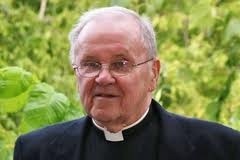 After a couple of stops as a parish pastor, Iowan James Siefkes landed in the western regional office of the ALC in Palo Alto, California. Rev. Siefkes was a third-generation Lutheran pastor after his father and grandfather. Serving in the San Francisco area during the tumultuous 1960s, Siefkes developed a program designed to introduce clergy and spouses to hot-button issues such as the Vietnam war, campus riots, runaway youth, drugs, and more. His Matrix program offered the streets of San Francisco as Petri dish for clergy to examine life on the edge.
After a couple of stops as a parish pastor, Iowan James Siefkes landed in the western regional office of the ALC in Palo Alto, California. Rev. Siefkes was a third-generation Lutheran pastor after his father and grandfather. Serving in the San Francisco area during the tumultuous 1960s, Siefkes developed a program designed to introduce clergy and spouses to hot-button issues such as the Vietnam war, campus riots, runaway youth, drugs, and more. His Matrix program offered the streets of San Francisco as Petri dish for clergy to examine life on the edge.
I would set up a program, take maybe thirty, forty people and move them into the YMCA in the Tenderloin in San Francisco and, then, would try to introduce them to what was going on in the Bay Area at that time.
Matrix came to the attention of the ALC home office in Minneapolis, and Pastor Siefkes was offered a position to develop something similar; he was to establish and lead a new ALC department to be called, “Congregational Social Concerns.” So far, so good, but when he invited approximately sixty persons from the Twin Cities (Lutheran and Catholic Social Services, ALC executives, an ALC bishop, the YMCA, the University of Minnesota Medical School, and more) to a seminar to evaluate the potential for ministry in the area of human sexuality, “the milieu heated up,” according to Siefkes. In particular, the scandalized director of Catholic Social Services published an unfriendly report in Commonweal magazine entitled, “Sex, Sex, Sex!”
Undeterred, Siefkes successfully sought a small ALC appropriation of a few thousand dollars:
To enable at least one national meeting of up to twenty ALC homosexual persons plus 5 resource persons to discuss their sexual orientation and their relationship because of it, to society and their church; to the end that they may address the church and the church might respond to them and become less a source of oppression to ALC and other persons with homosexual orientation.
Earlier, Siefkes had been interviewed by a reporter from the Minneapolis Star Tribune, Howard Erickson, who was a closeted gay man who also published in the gay periodical, The Advocate, under the pseudonym, Bjorn Bjornson. Erickson’s Advocate article introduced Siefkes to the gay community as an ally, and Siefkes used contacts he attained following that article to invite around twenty gay and lesbian persons to an inaugural meeting in Minneapolis in June 1974. Five persons actually attended the weekend event, including reporter Erickson. Siefkes himself stepped back and let the five persons plus three facilitators conduct the meeting themselves.
On Sunday evening, June 16, 1974, Siefkes and his wife, Sally, joined the others for a social event and report at a professor’s home near the University of Minnesota campus. When he arrived, he learned that Lutherans Concerned had been born, the LGBT advocacy group that would grown in size and strength and become the lobbying force that encouraged the ELCA to revise its attitude and policies toward gays and lesbians. Five LGBT Lutherans and three facilitators would have “an impact way out of proportion to their numbers.” Sort of like five fishes and two loaves.
The conservative Lutheran press picked up on the story and lambasted the “Dollars for Disobedience” appropriation. By printing copies of the organizational newsletter, including the subscription form, the conservative publication unwittingly helped to spread the word. Four years later at the first national gathering of Lutherans Concerned, reporter Erickson would reminisce, “We five had our differences, all right, but it started to look like this nestling we’d hatched just might be around for awhile.”
In 1992, Lutherans Concerned established the Jim Siefkes Justice-Maker Award, to recognize superior and tireless efforts of straight allies on behalf of LGBT Lutherans. Siefkes himself was honored with the 2010 Peace and Justice Award from the Hawkinson Foundation. The award honors individuals or couples who have made significant and sustained contributions to peace and justice. Now retired, Siefkes remains in Minneapolis and helped me with background information to the founding of Lutherans Concerned (now ReconcilingWorks).
This is the fifth installment in the series Cast of characters countdown. I will continue to post biographical notes about the iconic pilgrims and prophets on the road to full inclusion who are featured prominently in Queer Clergy. Here’s the list of prior posts:
1968 Troy Perry (founder of the MCC)
1970 Robert Mary Clement (gay priest who marched in the first Gay Pride parade)
1970-72 William Johnson (first out gay man to be ordained by a traditional denomination)
1972-77 Ellen Marie Barrett (first out lesbian ordained to the Episcopal priesthood)
Related Posts:Cast of characters countdown: William R. JohnsonCast of characters countdown: Ellen Marie BarrettQueer Clergy EndorsementsGays in the PulpitSynopsis of “Queer Clergy”
November 11, 2013
Cast of characters countdown: Ellen Marie Barrett
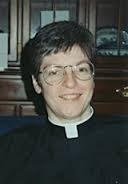 In 1970, the Episcopal General Convention authorized diaconal ordination for women, a non-sacerdotal role. Two years later, Bishop Paul Moore, Jr., of the Episcopal Diocese of New York, interviewed Ellen Marie Barrett, an early female candidate for ordination to the diaconate.
In 1970, the Episcopal General Convention authorized diaconal ordination for women, a non-sacerdotal role. Two years later, Bishop Paul Moore, Jr., of the Episcopal Diocese of New York, interviewed Ellen Marie Barrett, an early female candidate for ordination to the diaconate.
I asked her to sit down on the sofa across from the wing chair where I usually sit when someone comes to see me. Ellen is tall, with dark brown hair conservatively styled. She, like many tall people, stoops a little as she walks. Her most arresting feature is her eyes, which appear honest, deep, and welcoming … In conversation, she seems rather soft, until the discussion finds its way into an area of faith or conviction. Then you strike rock.
Though the progressive bishop was impressed with Barrett, he did not recommend her for ordination to the diaconate because she was an out lesbian. Barrett attended seminary. When she finished in 1975, she again asked Bishop Moore to approve her for ordination to the diaconate. He relented, and she was ordained a deacon in December, 1975 before a few church ladies, a few students, and her proud Southern mother. The ordination barely disturbed the church mice even though Barrett had been elected co-president of Integrity, an Episcopal LGBT advocacy group, at its inaugural national meeting earlier that year.
The following summer, the Episcopal General Convention went further; church canons were revised to allow women to be ordained to the priesthood, and many lined up for ordination when the policy would become effective in January, 1977. Deacon Barrett was among the hopeful women, but she and Bishop Moore weren’t prepared for the firestorm that awaited them. TV networks were there for her January ordination, which was a Time Magazine feature story.
The bishop and the lesbian priest were hounded mercilessly with calls, letters, and rejection. The last years of the decade of the seventies degenerated into the “height of homophobia” within the Episcopal Church. Barrett didn’t have a comfortable career and faced crushing depression. Eventually, she joined the Order of St. Benedict as Sister Bernadette.
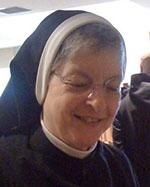 In researching her story, I located her in the Diocese of Newark, and I asked her to comment. Months passed, and I heard nothing. Then, a long email arrived. With Sister Bernadette’s permission, the entire email appears as a poignant coda to the Episcopal section of my book.
In researching her story, I located her in the Diocese of Newark, and I asked her to comment. Months passed, and I heard nothing. Then, a long email arrived. With Sister Bernadette’s permission, the entire email appears as a poignant coda to the Episcopal section of my book.
Here’s a snippet:
Would I do it again? Knowing what I know now? That’s not a question that can possibly have an answer. Today is a very different time. I have no idea whether God would have moulded my combination of weakness, pig-headedness, and some talent into what another time would need. I was what I was, and I did what I did, in the context of a particular time and socio-political climate.
Am I still convinced it was the right thing to do? Yes. Done the right way by the right person? Who knows? It is what it is. And priesthood is as much a part of me as green eyes and once black hair turning white.
I am a priest forever. That’s all.
This is the fourth installment in the series Cast of characters countdown. I will continue to post biographical notes about the iconic pilgrims and prophets on the road to full inclusion who are featured prominently in Queer Clergy. Here’s the list of prior posts:
1968 Troy Perry (founder of the MCC)
1970 Robert Mary Clement (gay priest who marched in the first Gay Pride parade)
1970-72 William Johnson (first out gay man to be ordained by a traditional denomination)
Related Posts:Gays in the PulpitQueer Clergy EndorsementsSynopsis of “Queer Clergy”Cast of characters countdown: William R. JohnsonCast of characters countdown: Robert Mary Clement
November 8, 2013
Cast of characters countdown: William R. Johnson
The Christopher Street Liberation Day parade from Greenwich Village to Central Park on June 28, 1970 was peaceful. Though police turned their backs on the marchers, they honored their parade permit.
Across the nation in San Francisco, police were less respectful at a much smaller event that same day, consisting of a couple of hundred queers at a ”Gay In” at Golden Gate park; police arrested several of the participants. San Francisco was years away from its later reputation as an LGBT friendly city.
Five years earlier, on New Year’s eve 1965, San Francisco police had broken promises made to the clergy organizers of a ball sponsored by the Council on Religion and Homosexuality. When police attempted to crash the ball, the word went out to the clergy organizers: “Get down here and wear your collar.” Lutheran pastor Chuck Lewis kept flash bulbs popping, and his assistant, Jo Chadwick, stuffed his film negatives in her bra to prevent the police from confiscating the photos. At a later press conference, clergy offered the “cloak of the cloth” moral authority, and the eyes of the nation witnessed the reality of police harassment of the gay community.
Five months after the arrests at the “Gay In” at Golden Gate Park, another historic event would quietly unfold across the Bay. Sitting atop “Holy Hill,” the neo-Gothic structures of the Pacific School of Religion (PSR) stand in stately vigil over San Francisco Bay across from the Golden Gate bridge. The stone and timber halls of PSR had long witnessed Christian activism. Founded by Yankee congregationalists from the east in 1866, the seminary prided itself on a “courage born of rashness.”
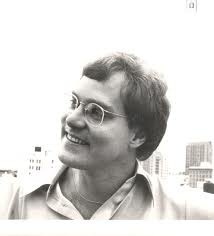 Four hundred students and others attended a homosexuality symposium in the seminary dining hall on November 11, 1970. When someone made an incendiary comment about gays, a young seminarian found himself rising to speak. His spontaneous comment changed his life and the course of church history.
Four hundred students and others attended a homosexuality symposium in the seminary dining hall on November 11, 1970. When someone made an incendiary comment about gays, a young seminarian found himself rising to speak. His spontaneous comment changed his life and the course of church history.
I am not a faggot, I am not a queer, I am not a fairy–but I am a practicing homosexual. And I can say that with joy–it is an affirmation which I make with pride.
Despite his impromptu “coming out” and over the objections of the seminary president, William R. Johnson continued in seminary and the Golden Gate Association of the United Church of Christ (UCC) ordained him to the ministry in June 1972 around the third anniversary of Stonewall. The UCC had accomplished another historic “first”—the first ordination of an out gay man by any traditional Christian denomination.
Thus began a distinguished career as the pastor to countless gay Christians, including many closeted clergy, and as the pan-denominational prophetic leader of the movement toward full inclusion. Rev. Johnson served as inspiration and strategist for the fledgling LGBT advocacy organizations that appeared in Protestant denominations during the 1970s, including as founder and first leader of what came to be known as the UCC Coalition. Later, he served for many years in the UCC home office.
Pastor Johnson has only recently retired. Elmhurst College, his alma mater, has honored him with an annual lecture series in his name. Pastor Johnson has also been a fact-checking source and supporter during my compilation of Queer Clergy: A History of Gay and Lesbian Ministry in American Protestantism. 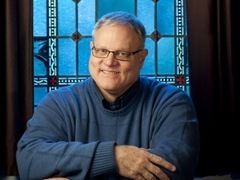
He offers this endorsement of the book:
“I have always known that this historical overview of the religious LGBT movement was needed not only to tell our movement stories to the masses but to make same-gender loving people aware of a significant but often overlooked part of their own history. This is a significant work by justice ally Obie Holmen — a singular contribution toward the full inclusion of LGBT people within Christian community and society. Many will be surprised by the breadth and depth of the movement in the Church.”
Related Posts:Cast of characters countdown: Robert Mary ClementQueer Clergy EndorsementsCast of characters countdown: Troy PerryGays in the PulpitSynopsis of “Queer Clergy”



